Once ants become established in your lawn, they can be hard to evict, but it’s far from an impossible task – so if this is a problem you’re dealing with, here are our top 13 tips to get rid of ants in lawn.
For a preview of a couple of the methods we’re going to be talking about, you can check out this video before reading on.
Why should you get rid of ants in your Lawn?
Ants can be responsible for several problems in your lawn, but the main one is that they throw up anthills over their nests with all the soil they excavate. These are unsightly, make it difficult to mow the lawn and cause the ground to become uneven, so it’s important to prevent them.
Another issue is that they harvest aphids, feeding on the honeydew they produce. For this reason, they protect aphids against their natural predators, leaving more aphids to feed on your plants.
Finally, with serious infestations, they can also damage the root system of your grass, causing areas to die, and if you find yourself facing any of these issues, you’ll need to act – so now let’s look at the options you have for dealing with an ant infestation in your lawn.
What to do if you have an ant infestation in your lawn
1. Hot water
This is one of the simplest methods that exists – all you need to do is locate the nest and pour boiling water into it. The basic idea is that this will kill the ants and prevent them from rebuilding their nest.
Pros
- Extremely easy to do
- Costs nothing
Cons
- Won’t kill all the ants
- Will need to repeat several times for it to be effective
- May kill your grass, leaving brown patches
- May leave wet, boggy areas in your lawn
2. Soapy water
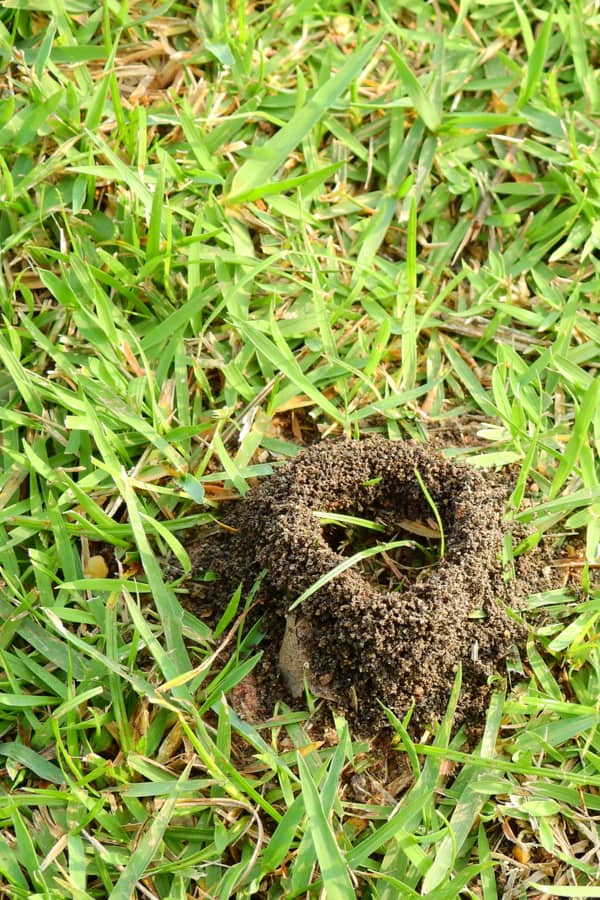
Another quick and easy method you can try is to use soapy water to rid yourself of the invaders. All you need to do is mix a tablespoon of eco-friendly detergent with a quart of water.
Pour this mixture into a spray bottle and use it to spray over ant trails, any plants or trees where ants are present and over the colony.
You can also pour the mixture directly into the colony or anthill in the same way as with boiling water.
Pros
- Quick and easy
- Doesn’t cost anything
Cons
- May not be 100% effective
- Will need to repeat several times
- Won’t kill all the ants
3. Washing up liquid and olive oil or canola oil
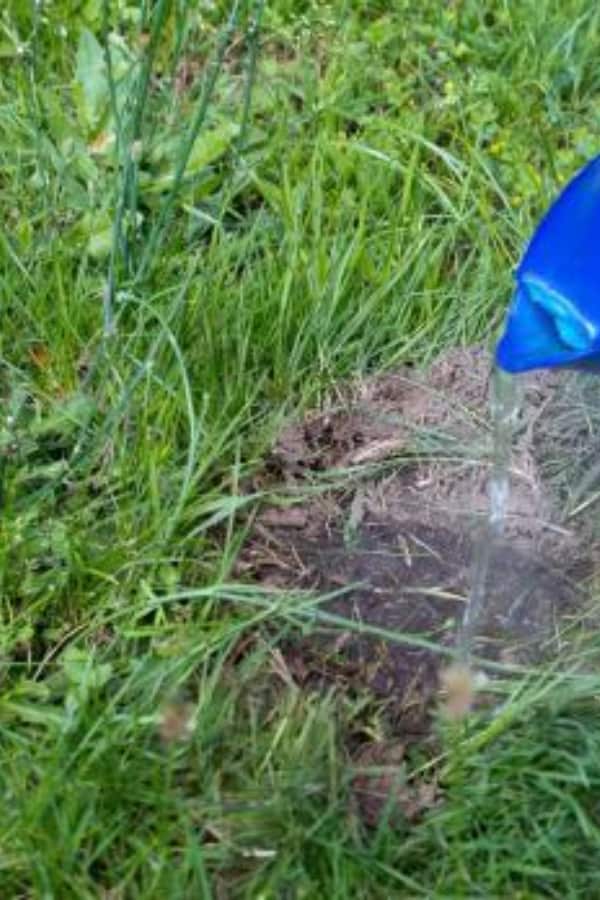
By adding olive oil or canola oil, some people claim the mixture becomes more effective at killing the ants. The theory is that the oil blocks up the spiracles, openings in the ants’ exoskeletons that they breathe through, effectively suffocating them to death.
Mix one tablespoon of oil, one tablespoon of washing up liquid and a quart of water to create the solution then use it as a spray or to pour into the nest.
Pros
- Arguably more effective than using soap and water alone
- Cheap and easy to make with ingredients most people have at home
Cons
- Doesn’t work immediately, requiring you to repeat the process multiple times
- Won’t kill all the ants
- May damage your grass
4. Diatomaceous earth
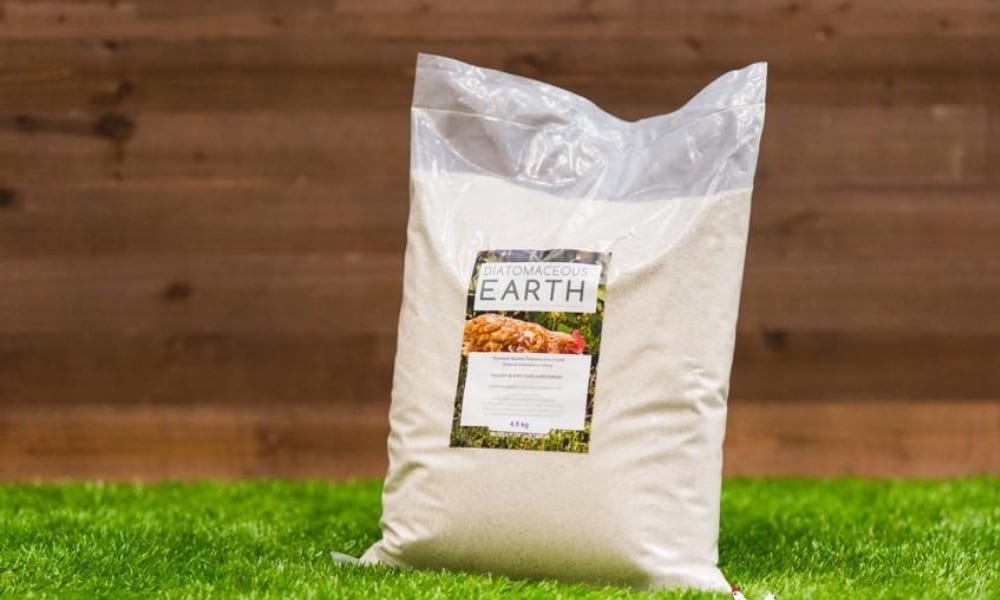
Diatomaceous earth is a fine dust made up of the fossilized skeletons of diatoms, a type of hard-shelled organism.
It is available as either industrial-grade or food-grade versions, and if you choose the latter, it is lethal to ants but harmless to humans.
As a bonus, it also contains various nutrients that are beneficial to your lawn and will help keep your grass healthy.
To use it, simply sprinkle the powder wherever you see the ants, including over and into the nest. It works by dehydrating the ants, and eventually, they will all die. However, this is not a fast method, and you will have to wait a while to see any results.
Pros
- Inexpensive
- Effective method
- Safe around kids and pets
- Beneficial for your lawn
Cons
- Takes some time to work
- Can be washed away in rain
5. Boric acid and sugar
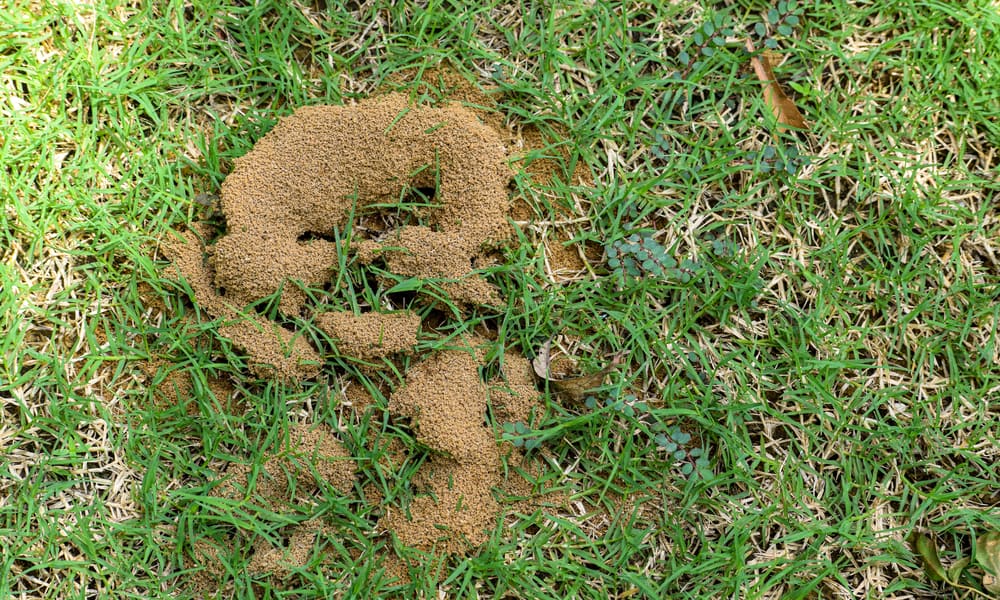
Another option that will kill ants is to mix up a paste using boric acid and sugar to apply to the nest.
The sugar attracts the ants to it as a food source, and the ants then carry the mixture into their nest where the boric acid kills them.
The problem here is that it’s difficult to judge the mixture. If you don’t use enough acid, the ants will just eat the sugar without being affected. However, on the other hand, if you don’t use enough, they will die before they reach the nest, and the remedy won’t work.
Pros
- Effective method if you get it right
- Safe around animals and children
Cons
- Hard to get the right ratio of boric acid and sugar for it to work properly
- Can kill grass
- Boric acid is not something that everyone will have at home
6. White vinegar
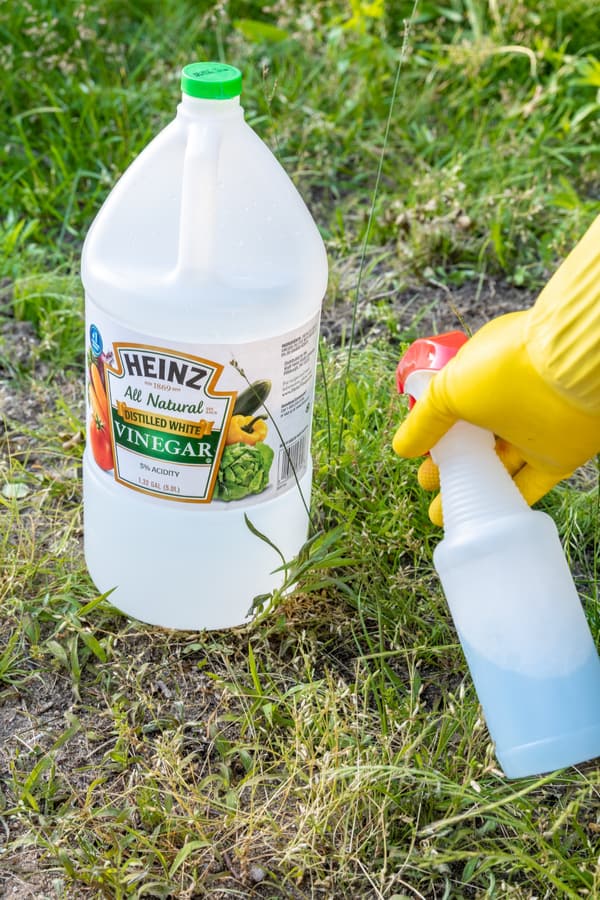
A popular remedy for ants is to use that all-purpose magic elixir, white vinegar. Just mix up a potion of one part vinegar and one part water and use it as a spray or to pour into the nest.
Another version of this method just uses pure white vinegar without mixing it with anything – pouring this directly into the nest is sure to spoil the ants’ day.
However, the main drawback is that it will probably damage your lawn and can dry out the top layer of the soil, so some people might choose to try something else instead.
Pros
- Will kill lots of ants
- Non-toxic method so safe around children and animals
- Inexpensive
Cons
- Kills grass
- Damages soil
7. Chili powder (and peppermint)
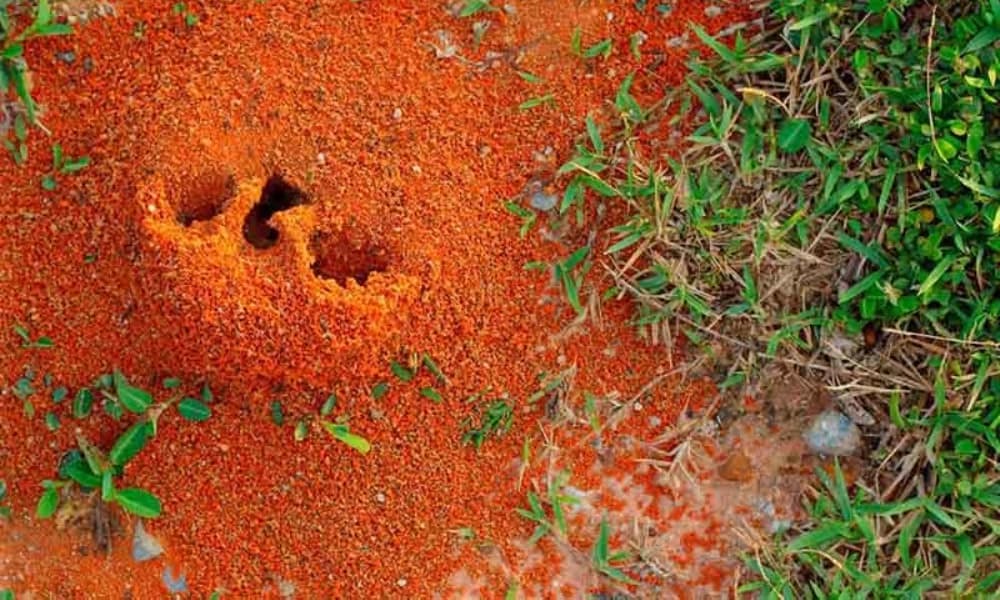
A debatable option – although one that many people believe in – is to spread chili powder or cayenne pepper in places where you have a problem with ants, including over and into the nest.
The idea is that this will irritate the ants to the point where they will give up the nest and leave in search of a new home. However, the efficacity of this method is debatable.
It may be possible to increase the potency of the powder by adding peppermint, either in oil or dehydrated form – although, again, the method may or may not yield results.
Pros
- Safe and non-toxic
- Inexpensive
Cons
- Debatable efficacity
8. Cinnamon oil
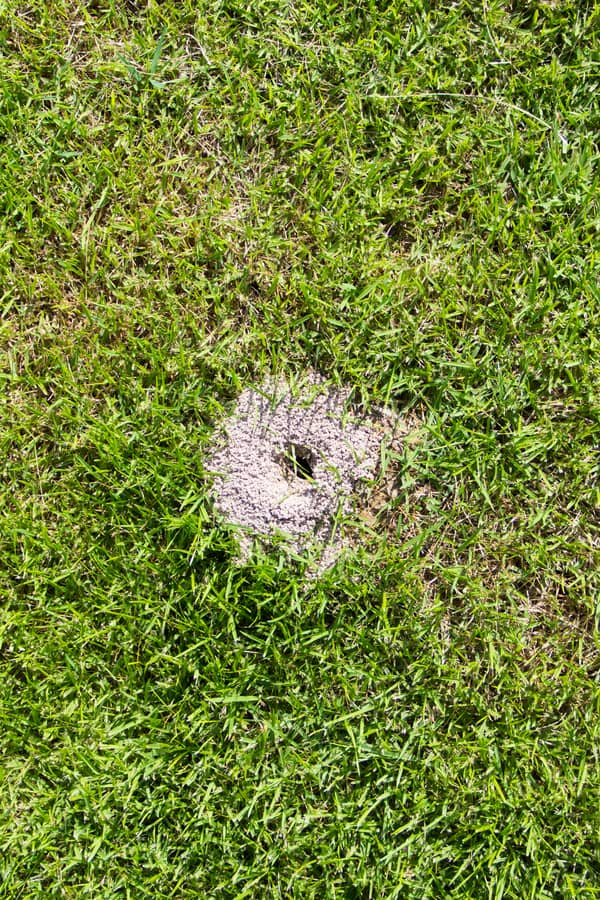
Another mixture to try is water combined with a few drops of cinnamon oil and used as a spray or to pour into the nest. This method works, but it can also kill grass or other plants.
You can also use ground cinnamon or cloves if you don’t have cinnamon oil to hand.
Pros
- Inexpensive and easy
- Safe and non-toxic
Cons
- May kill grass or other plants
9. Baby powder
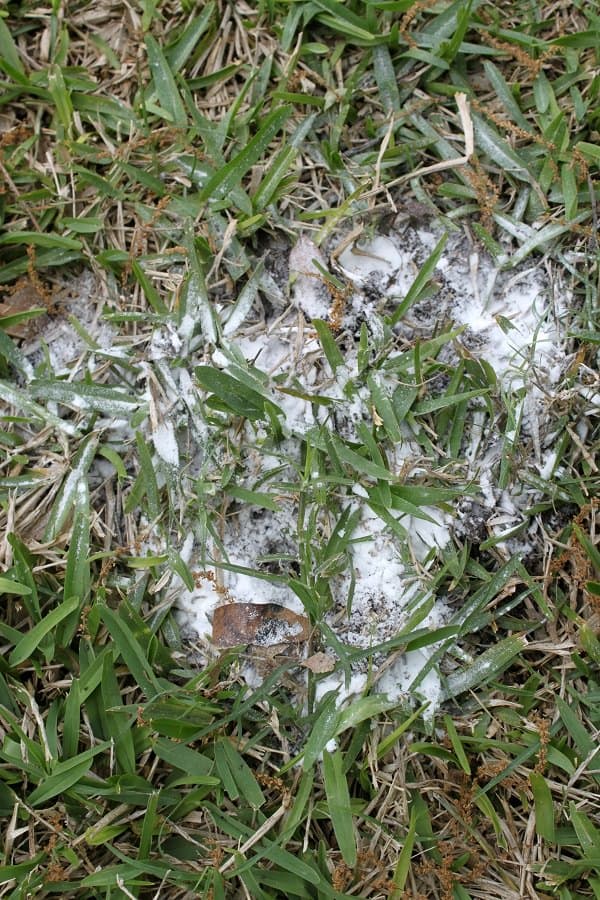
Like using oils or some other substances, baby powder blocks the ants’ spiracle, preventing them from breathing and so killing them. Simply spread the powder over areas where you have an ant infestation to do the job.
Baking soda can also be substituted.
Pros
- Cheap, easy and safe
- Effective at killing ants
Cons
- Won’t kill all the ants deep in the nest
10. Salt

Another substance that can be mixed with water and used to deter or kill ants is salt. Since it is a desiccant, it causes the ants to die of dehydration. All you need to do is spray the saline solution over ant trails and into the nest for it to do its job.
However, be careful about using too much since salt will also kill your lawn or plants.
Pros
- Effective technique
- Simple and won’t cost anything
Cons
- Kills grass and other plants
11. Orange or lemon peel
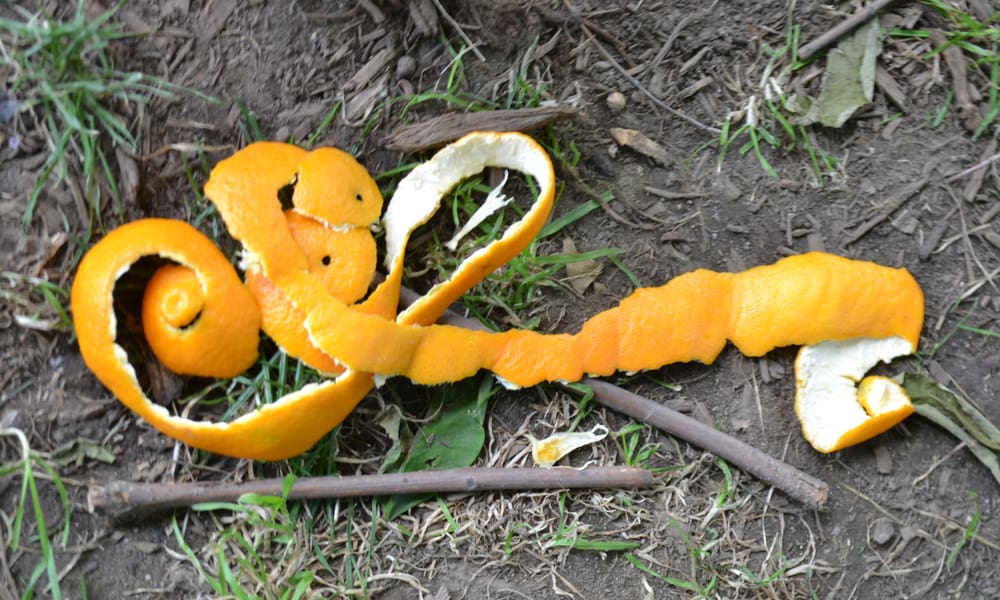
The peel from citrus fruits such as oranges or lemons is said to repel ants, and it also supposedly kills the fungus they feed on.
For this reason, by spreading pieces of peel throughout your yard and placing them over ant nests, you can irritate them, starve them and encourage them to move on.
Unfortunately, like using chili powder, the efficacity of this method is debatable – although some people insist it works, making it worth a try.
Pros
- Costs nothing if you eat oranges anyway
- Perfectly safe and non-toxic
Cons
- Efficacity unsure
- You end up with pieces of fruit peel strewn throughout your yard and over your lawn
12. Break open the nest
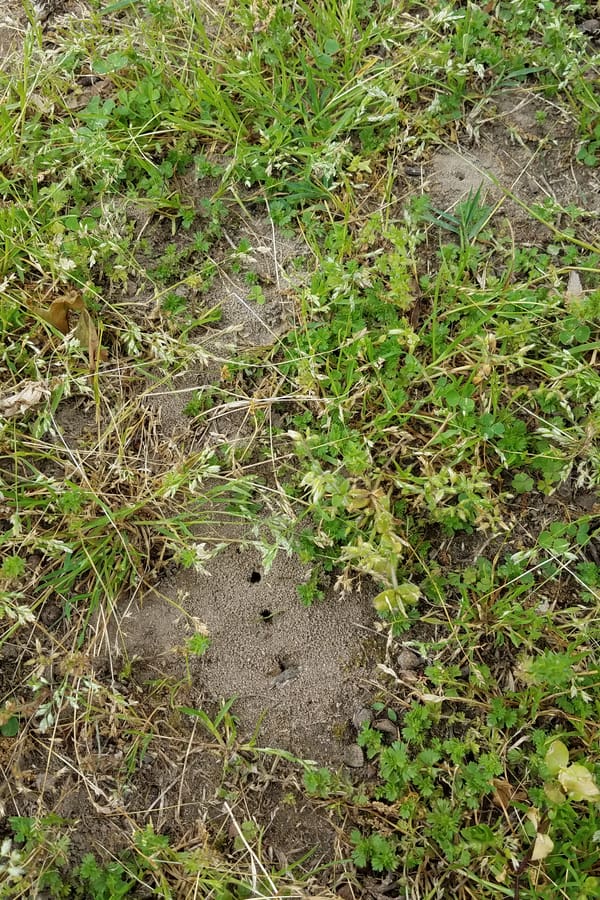
The problem with a lot of the methods we’ve looked at so far is that they only kill ants on the surface but won’t kill all the ants deep within the nest. For that reason, another useful technique is to break open the nest.
If you rake out anthills, it prevents the tunnels from hardening, protecting the colony within. It will also disturb the ants, potentially causing them to abandon the nest and move to somewhere more peaceful.
Even better is to dig down into the nest itself with a stick, disturbing them further. If you combine this with pouring in boiling water or one of the other suggested home remedies, you have more chance of killing a greater number or forcing them to abandon their nest.
This type of approach could be the most efficient option short of turning to chemicals.
Pros
- Disturbs the ants, potentially causing them to abandon the nest
- Allows you to attack the nest directly using boiling water or other means
- Costs nothing, is easy to do and is non-toxic
Cons
- You need to be careful not to damage your lawn when raking the anthill
- Still not guaranteed to resolve a serious infestation
13. Chemical solutions
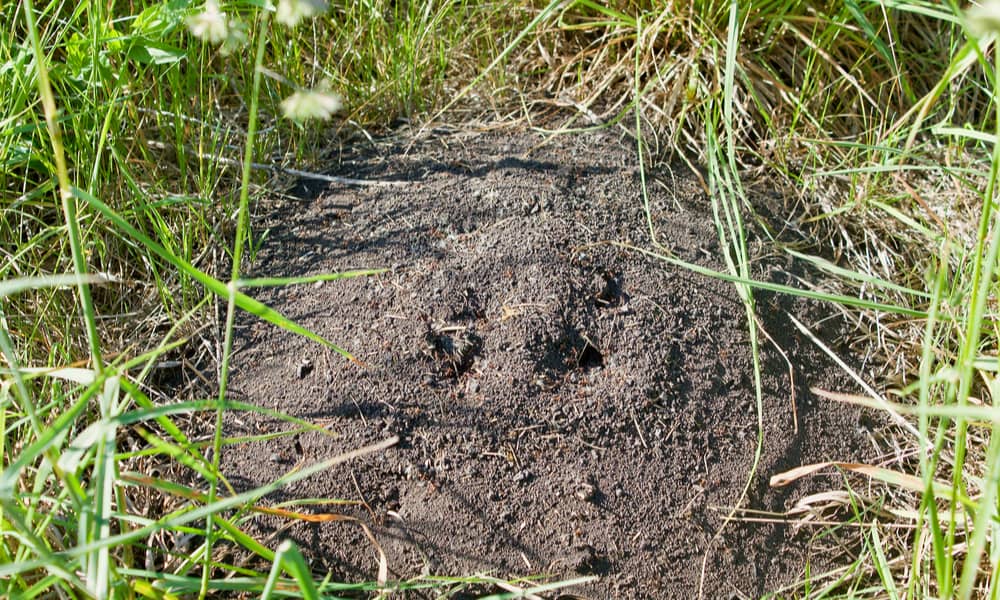
The final option is to resort to chemical pesticides. These come in various guises, for example, soluble versions to pour into the nest or bait traps that kill a colony by causing the ants to carry the poison back into the nest as food.
These solutions are effective and will usually kill the whole colony without harming your lawn – although some pesticides can damage lawn too and shouldn’t be used around edible plants.
Pesticides, especially bait traps, are also not suitable for use where children or animals are present, and if they are, other options should be sought.
Pros
- Highly effective
- Kills the whole colony
- Usually kills ants without harming your lawn
Cons
- Not suitable for use when children or animals are present
- May still harm the environment and damage your lawn
- Not suitable for use near edible plants
Deterrence
Since ants can be so difficult to evict once they’ve made a home in your lawn, it might be a better option to prevent them from becoming established in the first place.
To do this, move all food sources away from your lawn so they have nothing to eat. This might mean ensuring your compost pile, garbage or any organic waste are not kept near your lawn.
Ants like well-drained soils that are not compacted, which is how a healthy lawn should be, but keeping it well watered can help discourage them since they prefer dry areas to make their nests in.
They also prefer shorter grass, so allowing your grass to grow longer will make your lawn a less desirable area for them to move into.
On the other hand, sparse or patchy grass is ideal for ants, so if you let bald areas appear, you are giving ants the opportunity to make it their home.
This means you should make sure you reseed any areas where grass is not growing to stop them building a nest there.
In short, if your lawn remains in good health, ants are less likely to want to make their home there.
Let them be
The other option if you have ants in your lawn is just to leave them there. It’s impossible to rid your lawn of every last ant, and if they aren’t causing the kind of problems we mentioned at the beginning of this post, there’s no reason to spend time evicting them.
On the contrary, ants can be beneficial since they eat pests like termites and ticks, help aerate the soil and can also pollinate flowers – so the easy answer to ants in your lawn is just to let them be.
To learn more, here’s an interesting video that tells you a bit about some of the benefits of having ants in your lawn.
A range of methods to try
As you can see, there are many home remedies you can try to deter ants from making a home in your garden, and most of them are inexpensive and safe to use, even if you have kids or pets in your home.
As a last resort, you can turn to pesticides too – but before doing so, you should also consider whether you really need to kill the ants at all or if you might be better off just leaving them in peace.
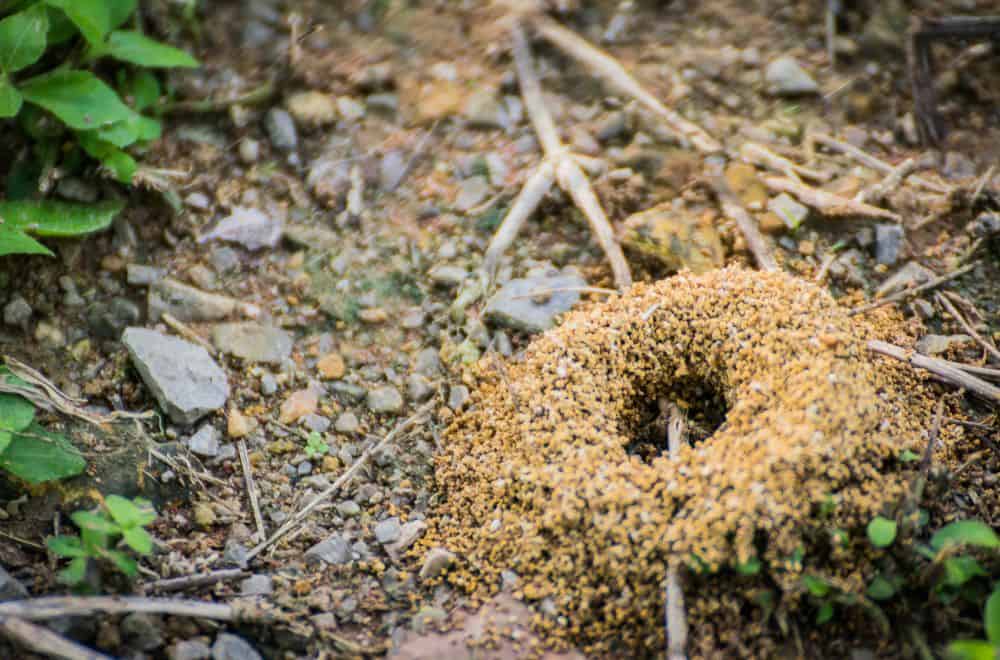
Leave a comment